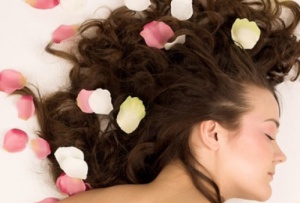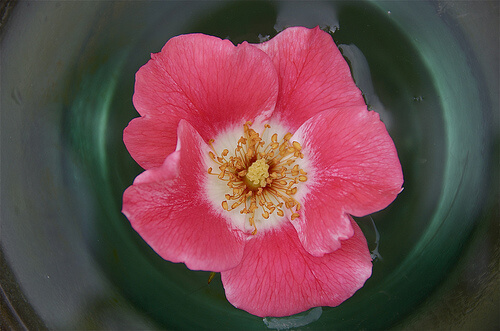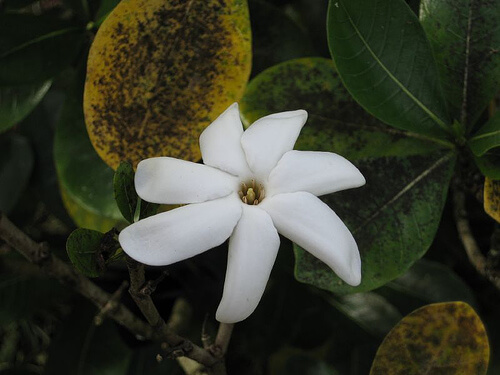How to Naturally Perfume Your Hair

Special hair perfumes are becoming widely commercialized. But in this article, we’re going to show you some ways to naturally perfume your hair by making your own fragrances, or choosing more natural alternatives with deliciously fruity, exotic, and floral smells.
Plus, these are all alcohol-free (it dries hair out) and have therapeutic properties that are great for your hair.
How to naturally perfume your hair
Tahitian Monoi oil
Monoi or Tahitian oil is an excellent natural product, and you can use it for both hair and body. You get it by crushing Tiare (Gardenia tahitensis) flowers and mixing them with coconut oil, making for a special exotic aroma, similar to vanilla.
We recommend it especially for the summer. Not only will it perfume your hair, it will also help make it soft, shiny, and protect it from the sun. Plus, it provides vitamin E (a powerful antioxidant), moisturizes, and deeply repairs. If you use it frequently, you won’t need to apply masks after washing your hair.
We do not recommend it for oily hair types.
Floral waters (hydrosols)
Hydrosols come from distilling plants during the process of extracting their essential oils. Basically, what they are is the water left over from making the oil. They also contain the hydrosoluble elements from the plant, minerals, and a small amount of essential oil.
They hold onto a bit of the flower’s aroma and properties, but are much lighter and less concentrated. Even though they’re still not very well known, people have been using them therapeutically since ancient times.
Here are our top recommendations:
- Orange blossom hydrosol: orange blossom, or neroli, has a distinct, seductive aroma, with relaxing properties. It also regulates oil secretions on the scalp.
- Rosemary hydrosol: People have always used rosemary for hair health and beauty because it can help improve circulation, prevent hair loss, and regulate scalp problems. It’s also a great cleanser and has a refreshing, herbal aroma.
- Mint hydrosol: This is the most refreshing hydrosol of them all. It’s perfect for hot weather, when your scalp sweats easily. It also helps prevent dandruff.
You might like:
Discover the Incredible Uses and Benefits of Rosemary
You absolutely have to make sure a hydrosol is good quality and pure. There are a lot of artificial essences out there that are being marketed as “natural,” when they’re really not.
Rose water
Rose water is an excellent flower water, especially popular in Indian traditional medicine. It has a delicate and very feminine aroma. You can also use it as a balancing agent, a regenerater, and an antioxidant. We recommend it for intimate, special occasions because it also has aphrodisiac properties.

Concentrated lavender infusion
Lavender has a potent cleansing and relaxing effect. It also has a delicious aroma, which makes makes it a great option for naturally perfuming your hair. All you have to do is prepare a concentrated infusion with its flowers.
It also has a very soft fragrance, perfect throughout the day, around children, etc.
Essential oils
The most simple method of preparing your own natural hair perfumes is to use whichever essential oils you like best. All you need to do is place a few drops in a bit of water, shake well and spray. Here are our recommendations:
- Ylang-ylang: an intense floral aroma with aphrodisiac properties.
- Mandarin: very sweet and refreshing, it also has relaxing properties that can improve moods and bring happiness.
- Bergamot: bergamot is what gives black tea its characteristic taste. It has a very special aroma with anti-depressant properties.
- Jasmine: soft, delicate, and relaxing, it combines very well with other aromas.
- Lemon: lemon provides a sense of cleanliness and freshness, and combines perfectly with other citrus aromas.
How to apply them
Pour the perfume into a spray bottle and spray on your hair from at least 20 cm away. Make sure to spread it evenly throughout your hair, without getting it too wet. You could even massage it in or brush through your hair to spread it around.
We recommend carrying the perfume in your purse so you can apply it to your hair any time you’ve been exposed to strong odors.
Photos courtesy of Ros in Wonderland and petalouda62.
All cited sources were thoroughly reviewed by our team to ensure their quality, reliability, currency, and validity. The bibliography of this article was considered reliable and of academic or scientific accuracy.
- N. T. Minh Tu; L. X. Thanh; A. Une; H. Ukeda; M. Sawamura. 2002. Volatile constituents of Vietnamese pummelo, orange, tangerine and lime peel oils. https://onlinelibrary.wiley.com/doi/abs/10.1002/ffj.1076
- Paul Forlot; Paul Pevet. 2011. Bergamot (Citrus bergamia Risso et Poiteau) essential oil: Biological properties, cosmetic and medical use. A review. https://www.tandfonline.com/doi/abs/10.1080/10412905.2012.659527
- G. R. Mallavarapu; K. N. Gurudutt; K. V. Syamasundar. 2016. Chapter 99 – Ylang–Ylang (Cananga odorata) Oils. https://www.sciencedirect.com/science/article/pii/B9780124166417000997
- S. G. Agarwal, Aruna Gupta, B. K. Kapahi, Baleshwar, R. K. Thappa & O. P. Suri (2005) Chemical Composition of Rose Water Volatiles, Journal of Essential Oil Research, 17:3, 265-267, DOI: 10.1080/10412905.2005.9698897
- M R AI-Sereiti, K M Abu-Amerb, P Sen. 1999. Pharmacology of rosemary (Rosmarinus oificinalis Linn.) and its therapeutic potentials. Indian Journal of Experimental Biology. http://nopr.niscair.res.in/bitstream/123456789/18973/1/IJEB%2037%282%29%20124-130.pdf
- Various authors. 2008. Relaxation effects of lavender aromatherapy improve coronary flow velocity reserve in healthy men evaluated by transthoracic Doppler echocardiography. International Journal of Cardiology. https://www.sciencedirect.com/science/article/abs/pii/S0167527307012612
This text is provided for informational purposes only and does not replace consultation with a professional. If in doubt, consult your specialist.









